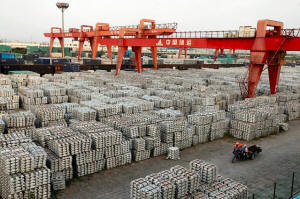|
China says will hit back after U.S.
proposes fresh tariffs on $200 billion in goods
 Send a link to a friend
Send a link to a friend
 [July 11, 2018]
By Tony Munroe and Eric Beech [July 11, 2018]
By Tony Munroe and Eric Beech
BEIJING/WASHINGTON (Reuters) - China
accused the United States of bullying and warned it would hit back after
the Trump administration raised the stakes in their trade dispute,
threatening 10 percent tariffs on $200 billion of Chinese goods.
China's commerce ministry said on Wednesday it was "shocked" and would
complain to the World Trade Organisation, but did not immediately say
how it would retaliate. In a statement, it called the U.S. actions
"completely unacceptable".
The foreign ministry described Washington's threats as "typical
bullying" and said China needed to counter-attack to protect its
interests.
"This is a fight between unilateralism and multilateralism,
protectionism and free trade, might and rules," foreign ministry
spokeswoman Hua Chunying told a regular briefing on Wednesday.
Beijing has said it would hit back against Washington's escalating
tariff measures, including through "qualitative measures," a threat that
U.S. businesses in China fear could mean anything from stepped-up
inspections to delays in investment approvals and even consumer
boycotts.

China could also limit visits to the United States by Chinese tourists,
a business state media said is worth $115 billion, or shed some of its
U.S. Treasury holdings, Iris Pang, Greater China economist at ING in
Hong Kong, wrote in a note.
The $200 billion far exceeds the total value of goods China imports from
the United States, which means Beijing may need to think of creative
ways to respond to such U.S. measures.
On Tuesday, U.S. officials issued a list of thousands of Chinese imports
the Trump administration wants to hit with the new tariffs, including
hundreds of food products as well as tobacco, chemicals, coal, steel and
aluminum, prompting criticism from some U.S. industry groups.
It also includes consumer goods ranging from car tires, furniture, wood
products, handbags and suitcases, to dog and cat food, baseball gloves,
carpets, doors, bicycles, skis, golf bags, toilet paper and beauty
products.
"For over a year, the Trump administration has patiently urged China to
stop its unfair practices, open its market, and engage in true market
competition," U.S. Trade Representative Robert Lighthizer said in
announcing the proposed tariffs.
"Rather than address our legitimate concerns, China has begun to
retaliate against U.S. products ... There is no justification for such
action," he said in a statement.
Last week, Washington imposed 25 percent tariffs on $34 billion of
Chinese imports, and Beijing responded immediately with matching tariffs
on the same amount of U.S. exports to China. Each side is planning
tariffs on a further $16 billion in goods that would bring the totals to
$50 billion.
MARKETS RATTLED
Investors fear an escalating Sino-U.S. trade war could hit global growth
and damage sentiment.
On Wednesday, the MSCI's broadest index of Asia-Pacific shares outside
Japan <.MIAPJ0000PUS> was down about 1 percent, while the main indexes
in Hong Kong <.HSI> and Shanghai <.SSEC> recovered somewhat after
falling more than 2 percent.
S&P 500 <ESc1> and Dow futures <YMc1> dropped around 1 percent, pointing
to a weak opening on Wall Street later on Wednesday.
The onshore yuan tracked its offshore counterpart lower with traders
closely watching the key 6.7 per dollar level as pressure mounted on the
currency.
U.S. President Donald Trump has said he may ultimately impose tariffs on
more than $500 billion worth of Chinese goods - roughly the total amount
of U.S. imports from China last year.
[to top of second column]
|

Workers ride on an motor rickshaw through an aluminium ingots depot
in Wuxi, Jiangsu province in this September 26, 2012 file picture.
REUTERS/Aly Song/File Photo

The new list published on Tuesday targets many more consumer goods
than those covered under the tariffs imposed last week, raising the
direct threat to consumers and retail firms and increasing the
stakes for lawmakers in Trump's Republican party facing elections in
November.
The list is subject to a two-month public comment period before
taking effect.
'TARIFFS ARE TAXES'
Some U.S. business groups and lawmakers from Trump's own Republican
Party were critical of the escalating tariffs.
Senate Finance Committee Chairman Orrin Hatch said the announcement
"appears reckless and is not a targeted approach."
The U.S. Chamber of Commerce has supported Trump's domestic tax cuts
and efforts to reduce regulation of businesses, but does not back
Trump's aggressive tariff policies.
"Tariffs are taxes, plain and simple. Imposing taxes on another $200
billion worth of products will raise the costs of every day goods
for American families, farmers, ranchers, workers, and job creators.
It will also result in retaliatory tariffs, further hurting American
workers," a Chamber spokeswoman said.
Louis Kuijs, Hong Kong-based Head of Asia Economics at Oxford
Economics, said while he expects China to strongly condemn the U.S.
moves, its policy response is likely to be limited for now.
"In part because they have only limited ammunition and in part
because it's still early in the process on the U.S. side," Kuijs
said.
Trump has been following through on pledges he made during his
presidential campaign to get tough on China, which he accuses of
unfair trade practices including theft of intellectual property and
forced technology transfer that have led to a $375 billion U.S.
trade deficit with China.

China's exports have mushroomed since it joined the World Trade
Organisation in 2001, making it the world's second-largest economy
and prompting widening criticism in recent years from trading
partners that it has unfairly used global trade rules to its
advantage.
As its dispute with Washington deepened, Beijing has been calling on
other countries to support global free trade and has talked up
efforts to ease investment rules. During a visit to Germany this
week by Chinese Premier Li Keqiang, the countries signed business
deals worth more than $23 billion.
"China stands in line with the international community on the
correct side of history to together protect the rules of the
multilateral trade order," foreign ministry spokeswoman Hua said on
Wednesday.
(Reporting by Eric Beech in WASHINGTON, Elias Glenn, Stella Qiu and
Christian Shepherd in BEIJING; Writing by Tony Munroe; Editing by
Shri Navaratnam and Sam Holmes)
[© 2018 Thomson Reuters. All rights
reserved.]
Copyright 2018 Reuters. All rights reserved. This material may not be published,
broadcast, rewritten or redistributed.
Thompson Reuters is solely responsible for this content. |